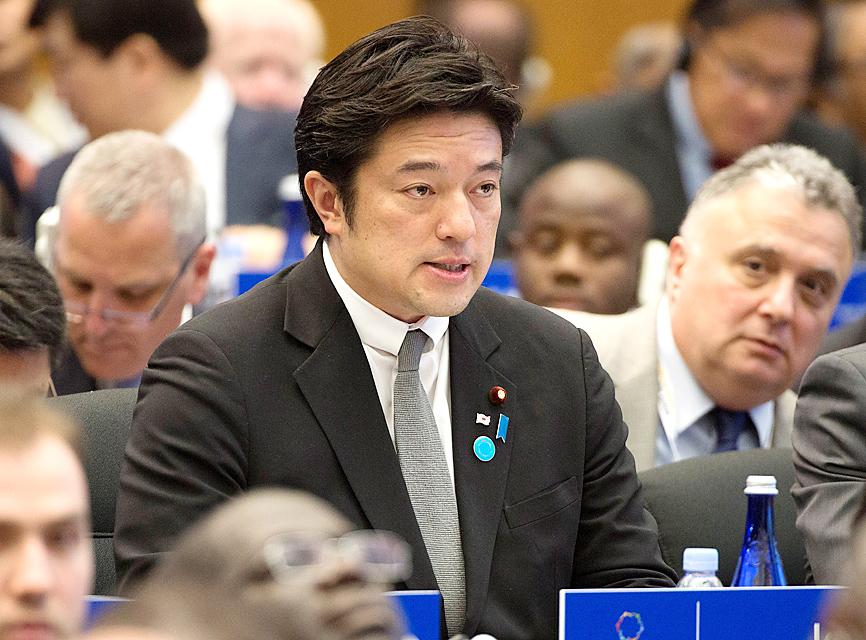A top Japanese defense official on Friday urged US president-elect Joe Biden to “be strong” in supporting Taiwan in the face of an aggressive China, calling the nation’s safety a “red line.”
“We are concerned China will expand its aggressive stance into areas other than Hong Kong. I think one of the next targets, or what everyone is worried about, is Taiwan,” Japanese State Minister of Defense Yasuhide Nakayama said in an interview.
Nakayama urged Biden to take a similar line on Taiwan as US President Donald Trump, who has significantly boosted military sales to the nation and increased engagement with it.

Photo: Reuters
Japan’s engagement with Taiwan has also flourished in the past few years on a largely non-governmental basis.
Tokyo maintains a “one China” policy, delicately balancing its relationships with neighboring giant China and its longtime military ally in Washington.
Japan shares strategic interests with Taiwan, which sits in sea lanes through which much of Japan’s energy supplies and trade flow.
“So far, I haven’t yet seen a clear policy or an announcement on Taiwan from Joe Biden. I would like to hear it quickly, then we can also prepare our response on Taiwan in accordance,” Nakayama said.
During the presidential campaign, Biden called for strengthening ties with Taiwan and other “like-minded democracies.”
Decades ago as a US senator, Biden questioned whether the US had an “obligation” to defend Taiwan, but many in his foreign policy circles acknowledge that US imperatives have changed as a rising, authoritarian China has become more assertive and sought to shape global institutions.
An official in Biden’s transition team said that the president-elect believes US support for Taiwan “must remain strong, principled and bipartisan.”
“Once in office, he will continue to support a peaceful resolution of cross-strait issues consistent with the wishes and best interests of the people of Taiwan,” the official said.
Beijing has been angered by increased US support for Taiwan, including arms sales and visits to Taipei by senior US officials, further straining already poor US-China ties.
“Taiwan is China’s internal affair,” Chinese Ministry of Foreign Affairs spokesman Wang Wenbin (汪文斌) said on Friday. “We firmly oppose interference in China’s internal affairs by any country or anyone by any means.”
In Taipei, Ministry of Foreign Affairs spokeswoman Joanne Ou (歐江安) said that there was strong bipartisan US support for Taiwan based on the “shared language” of freedom and democracy.
“Taiwan looks forward to working closely with the Biden team, to continue to steadily improve Taiwan-US relations on the basis of the existing solid friendship,” she said.
US officials in Tokyo could not be reached as the embassy was closed for Christmas.
“There’s a red line in Asia: China and Taiwan,” Nakayama said, citing a red line that former US president Barack Obama declared over Syria’s use of chemical weapons — a line Damascus then crossed.
Biden was Obama’s vice president.
“How will Joe Biden in the White House react in any case if China crosses this red line?” said Nakayama, who attended a memorial for former president Lee Teng-hui (李登輝) in August, before taking his defense position.
“The US is the leader of the democratic countries. I have a strong feeling to say: America, be strong,” Nakayama said.

MAKING WAVES: China’s maritime militia could become a nontraditional threat in war, clogging up shipping lanes to prevent US or Japanese intervention, a report said About 1,900 Chinese ships flying flags of convenience and fishing vessels that participated in China’s military exercises around Taiwan last month and in January have been listed for monitoring, Coast Guard Administration (CGA) Deputy Director-General Hsieh Ching-chin (謝慶欽) said yesterday. Following amendments to the Commercial Port Act (商港法) and the Law of Ships (船舶法) last month, the CGA can designate possible berthing areas or deny ports of call for vessels suspected of loitering around areas where undersea cables can be accessed, Oceans Affairs Council Minister Kuan Bi-ling (管碧玲) said. The list of suspected ships, originally 300, had risen to about 1,900 as

Japan’s strategic alliance with the US would collapse if Tokyo were to turn away from a conflict in Taiwan, Japanese Prime Minister Sanae Takaichi said yesterday, but distanced herself from previous comments that suggested a possible military response in such an event. Takaichi expressed her latest views on a nationally broadcast TV program late on Monday, where an opposition party leader criticized her for igniting tensions with China with the earlier remarks. Ties between Japan and China have sunk to the worst level in years after Takaichi said in November that a hypothetical Chinese attack on Taiwan could bring about a Japanese

Right-wing political scientist Laura Fernandez on Sunday won Costa Rica’s presidential election by a landslide, after promising to crack down on rising violence linked to the cocaine trade. Fernandez’s nearest rival, economist Alvaro Ramos, conceded defeat as results showed the ruling party far exceeding the threshold of 40 percent needed to avoid a runoff. With 94 percent of polling stations counted, the political heir of outgoing Costa Rican President Rodrigo Chaves had captured 48.3 percent of the vote compared with Ramos’ 33.4 percent, the Supreme Electoral Tribunal said. As soon as the first results were announced, members of Fernandez’s Sovereign People’s Party

MORE RESPONSIBILITY: Draftees would be expected to fight alongside professional soldiers, likely requiring the transformation of some training brigades into combat units The armed forces are to start incorporating new conscripts into combined arms brigades this year to enhance combat readiness, the Executive Yuan’s latest policy report said. The new policy would affect Taiwanese men entering the military for their compulsory service, which was extended to one year under reforms by then-president Tsai Ing-wen (蔡英文) in 2022. The conscripts would be trained to operate machine guns, uncrewed aerial vehicles, anti-tank guided missile launchers and Stinger air defense systems, the report said, adding that the basic training would be lengthened to eight weeks. After basic training, conscripts would be sorted into infantry battalions that would take